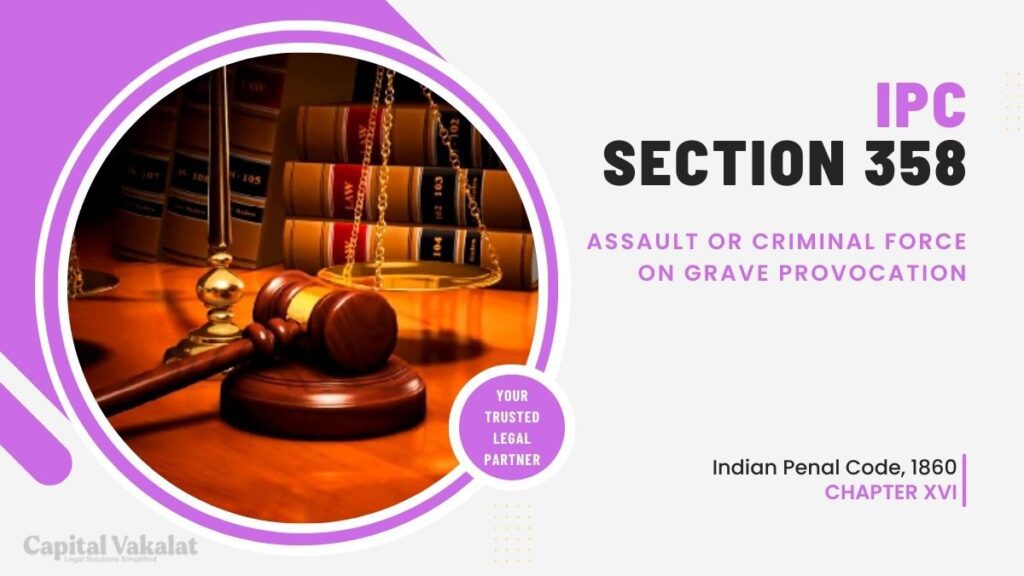In the realm of criminal law in India, Section 358 of the Indian Penal Code (IPC) holds a distinctive place, addressing the complex issue of assault or criminal force on grave provocation.

This article delves into the nuances of Section 358 IPC, shedding light on its definitions, legal implications, and the social fabric it seeks to protect.
Introduction
Understanding the intricacies of Section 358 IPC is crucial in navigating the legal landscape concerning assault and criminal force. This section plays a pivotal role in ensuring justice is served while considering the gravity of the provocation leading to the act.
Understanding Section 358 IPC
Section 358 IPC in Detail
Section 358 IPC, a cornerstone in the legal framework, outlines the parameters of assault or criminal force on grave provocation. To comprehend its implications fully, let’s break down the elements that constitute this offense and explore the intricacies of grave provocation.
Elements of the Offense
Assault or criminal force, as outlined in Section 358 IPC, involves specific elements that must be met for an act to be deemed an offense. This section carefully defines the boundaries within which an individual’s actions transform into a punishable act under the law.
Grave Provocation Defined
Central to Section 358 IPC is the concept of grave provocation. What constitutes grave provocation? Delving into the definition provides clarity on the circumstances that elevate a provocation to a level deemed grave under the law.
Distinction Between Assault and Criminal Force
Navigating the legal terminology can be perplexing, especially when distinguishing between assault and criminal force. Let’s clarify the nuances between these two terms, employing examples to illustrate their unique characteristics.
Assault vs. Criminal Force
While both assault and criminal force involve unwanted physical contact, the distinction lies in the severity and intent behind the act. Understanding these differences is essential to applying the law accurately.
Grave Provocation: What Constitutes It?
Scenarios Amounting to Grave Provocation
Exploring scenarios that may qualify as grave provocation is essential. From personal altercations to external factors, recognizing situations that trigger intense emotional responses helps in assessing the gravity of the provocation.
Factors Influencing the Assessment
The evaluation of grave provocation is not a one-size-fits-all process. Factors such as the mental state of the accused, the nature of the provocation, and the immediacy of the response play crucial roles in determining the severity of the offense.
Legal Consequences of Violating Section 358 IPC
Understanding the penalties and punishments prescribed by the law is vital. Section 358 IPC outlines the consequences for those found guilty of assault or criminal force on grave provocation. Additionally, exploring legal precedents provides insight into the judiciary’s approach to such cases.
Penalties and Punishments
From fines to imprisonment, the legal consequences for violating Section 358 IPC are severe. Analyzing these consequences serves as a deterrent while emphasizing the gravity of the offense.
Legal Precedents and Cases
Real-life cases serve as lessons in understanding the application of the law. Examining past cases related to Section 358 IPC provides valuable insights into the judicial interpretation and evolving standards concerning assault and criminal force.
Case Studies
Analyzing Real-Life Cases
Turning our attention to real-life scenarios, this section delves into case studies involving Section 358 IPC. By examining the outcomes and lessons learned from these cases, we gain a comprehensive understanding of the practical implications of the law.
Defenses Available
Legal defenses play a crucial role in ensuring a fair trial. Exploring the defenses available to individuals accused of assault or criminal force on grave provocation sheds light on the strategies that can be employed to safeguard their rights.
Defenses in Section 358 Cases
From self-defense to lack of intent, various defenses can be utilized in cases falling under Section 358 IPC. Understanding these defenses is essential for both legal practitioners and individuals accused of the offense.
Legal Strategies for Defendants
For defendants facing charges under Section 358 IPC, employing effective legal strategies is paramount. This section discusses the approaches that legal professionals can take to secure a favorable outcome for their clients.
Social Implications
The impact of assault or criminal force on grave provocation extends beyond the courtroom. This section explores the broader societal implications, emphasizing the need for preventive measures and collective responsibility.
Impact on Society
Examining the societal repercussions of such offenses highlights the importance of fostering a culture that discourages violence and promotes conflict resolution. The article discusses the role of education and awareness in shaping a safer community.
Recent Amendments or Changes
In the ever-evolving legal landscape, staying informed about recent amendments or changes is crucial. This section addresses any modifications to Section 358 IPC and analyzes how these changes may influence the interpretation and application of the law.
Adapting to Legal Changes
Understanding recent amendments ensures that legal practitioners and individuals are aware of the current state of the law. This adaptability is essential for navigating the complexities of Section 358 IPC effectively.
Conclusion
In conclusion, Section 358 IPC stands as a crucial pillar in addressing assault or criminal force on grave provocation. This article has explored the definitions, legal consequences, and societal implications of this section, emphasizing the need for a nuanced understanding to ensure justice prevails.
Frequently Asked Questions
Are there mitigating factors that can reduce the severity of the offense?
Yes, factors such as the accused’s mental state and the nature of the provocation can influence the assessment of the offense.
Is self-defense a valid defense under Section 358 IPC?
Self-defense can be a valid defense, but its applicability depends on the circumstances surrounding the incident.
How do recent amendments impact the application of Section 358 IPC?
Recent amendments may alter the legal landscape, influencing the interpretation and application of Section 358 IPC.
What role does public perception play in Section 358 cases?
Public perception can impact legal proceedings, highlighting the importance of a fair and impartial judicial process.